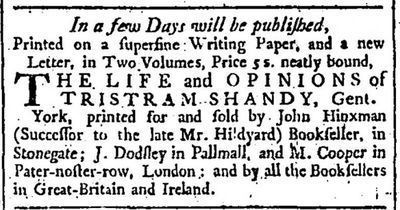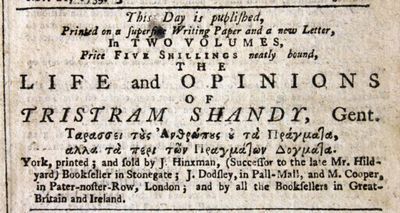Authors’ nous – Eliot, Dickens and Sterne

By MICHAEL CAINES
Not all authors have nous – meaning practical intelligence, to extend one OED definition of the word – when it comes to the business of selling books. But see above for a heartening example of George Eliot’s mind at work on this noble subject. Here, on May 2, 1873, “M. E. Evans" announces herself to be “nothing but content” with her publisher's proposal to reduce the price of her books from 3/6 to 2/6, and ditch some of the embellishments:
“To my taste the volumes will be better for being freed from the illustrations – save & except the pretty vignettes. . . . The appearance of the 3/6 volumes is so handsome that they may part with some of their costliness & yet be respectable.”
Eliot saw how such a simple expedient could benefit both parties:
“As to the effect on future sales I imagine that the wide distribution of Miss Austen’s books in the shilling copies greatly increased the sale of the Bentley’s Library Edition. The Parlour Library made her name. . . . Let us hope that the 2/6 edition of the five books would cause all the better sale for a future revised series including all my works – prose and verse.”
And so nous based on precedent (“the wide distribution of Miss Austen’s books”) joins hands with authorial tenderness for her own creations (“a future revised series” that tenderness eventually produced, a few years later, was the grand Cabinet Edition of Eliot’s works – twenty beautiful volumes – not exactly bestsellers, though. The cut-price Eliot, by contrast, points the way to the mass paperback schemes of the twentieth century.
The letter isn't in the standard edition of Eliot’s letters, and is currently itself on sale, for £3,000, courtesy of the nineteenth-century specialists Jarndyce, alongside other wonders I hope to gawp at during the London International Antiquarian Book Fair, which opens today. Jarndyce also have, for example, various Dickens ALSs, exhibiting nous, or at least an informed cynicism, as he seeks to prevent the unauthorized performance of a play by him and Wilkie Collins: “I privately doubt the strength of our position in the Court of Chancery, if we try it; but it is worth trying”.
Compare these wise authors of the nineteenth century with a recently discovered oddity concerning one of the greats of a hundred years earlier, Laurence Sterne.
The first volumes of Sterne’s ab ovo masterpiece, The Life and Opinions of Tristram Shandy, Gentleman, appeared in 1759. When exactly it was published that year has remained something of a mystery.
This much has been known for a while, courtesy of an advertisement spotted in the London Chronicle on December 20:
Which sent the investigators looking for a publication date around Christmas. Alas, that was the wrong way; and Elinor Camille-Wood and Patrick Wildgust have earned the admiration and gratitude of biographers, literary historians, pedants and obsessives the world over for turning in the other direction, and finding this ad buried in the York Courant for December 18:
This is good timing, as the tercenternary of Sterne’s birth falls this year. Does it have anything to do with authors’ nous? Well, maybe. Note that devilish Greek couplet in the middle of the York ad – it’s taken from Sterne’s title page:
You might wonder who thought it was a good idea to reproduce a motto from Epictetus (“Not things, but opinions about things, trouble men”), given that, as W. G. Day notes, “It is most unusual for Greek type to be used in an advertisement for a work of fiction in this way”. Was this Sterne himself “aiming his work at an audience of higher than average intelligence and linguistic competence”? And, showing another kind of nous, was it wiser of the London booksellers to take a more “pragmatic view of the market” and omit “what might have been seen as off-putting to many possible readers”?
“The Book will sell”, Sterne had assured them, earlier that year. A common conviction among his sort . . . .
Photo credits: George Eliot letter courtesy of Jarndyce; Tristram Shandy images courtesy of the Laurence Sterne Trust.
Peter Stothard's Blog
- Peter Stothard's profile
- 30 followers






